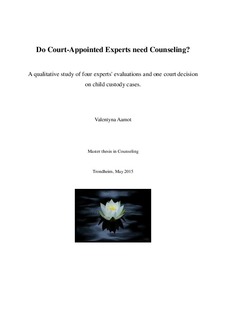| dc.description.abstract | The master thesis you are reading now is a qualitative research on meaning-making of experts in child custody cases. My goal was to get insight into these experts' reasoning and to figure out if there is a connection between the degree of reasoning complexity and quality of their evaluations.
To answer this question, I chose document analysis as a method. The documents constitute four experts reports and one court decision. The documents were chosen randomly, and the source ofdata was the Internet. The analysis was conducted within frameworks built on adult consciousness/awareness developmental theories. Some coding criteria were predetermined, others derived from the models description.
One of the important findings of the study is that experts show a striking consistency in their thinking. That is, they demonstrate a certain level of understanding complexity throughout many different domains. Further, they evaluate phenomena not from the standpoint of their expertise competency, but from their level of awareness. The stronger their awareness, the more understanding for complexity they show. This understanding of complexity displays itself in their elaboration on task complexity, context, others, self and different perspectives. Accordingly, this kind of elaboration results in better quality of their conclusions. Experts with stronger awareness issued evaluations that were humane with no damaging consequences for the children, and often their conclusions were win-win solutions.
These findings show that there is a gap in experts’ competency today, and that this gap cannot be filled by providing more expertise. Another kind of education is needed, which should aim at developing experts understanding of complexity, importance of cautiousness and awareness of different processes and states that can influence both others and their own interpretation of facts.
As I see it, these findings have a potential to transform the conventional view on experts role in the court system, as well as contribute to more effective quality assurance in child custody evaluations. | nb_NO |
